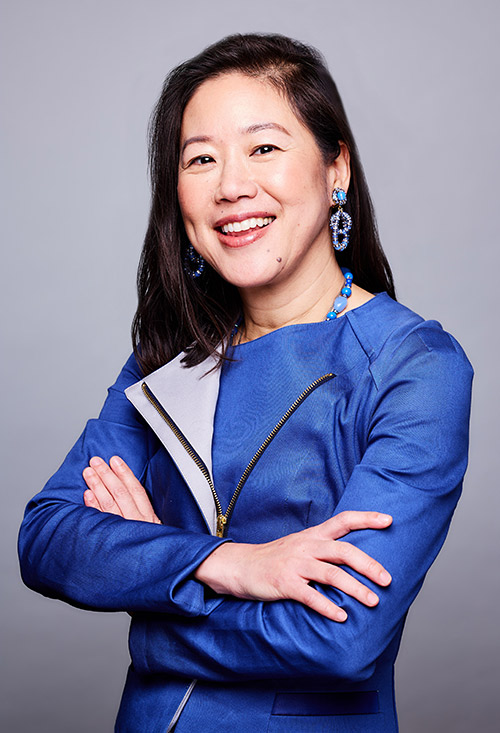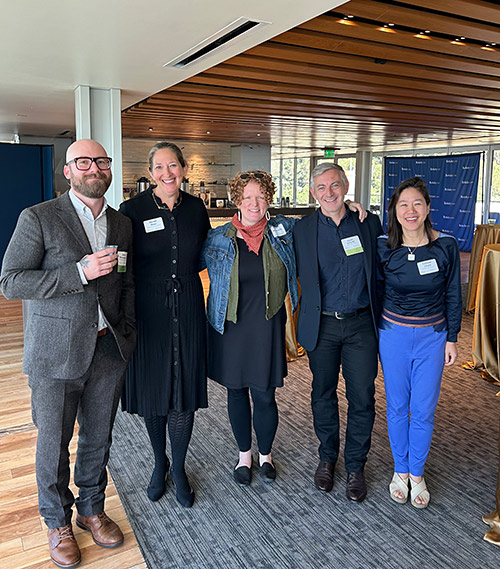By Gwyneth K. Shaw

Colleen Chien ’02, a cross-disciplinary scholar whose research spans innovation, intellectual property, and the criminal justice system, has just joined the Berkeley Law faculty — the school’s ninth hire this year.
Chien was a professor at Santa Clara University School of Law, a member of the Biden-Harris transition team, and has worked as a senior advisor on IP issues in the Obama White House, the U.S. Department of Commerce, and the U.S. Patent and Trademark Office, where she currently serves as a Marion Croak Distinguished Scholar.
A widely-cited IP scholar, Chien is the Berkeley Center for Law & Technology’s (BCLT) newest faculty co-director. She’s known for her in-depth empirical studies of patent litigation, patent-assertion entities — a term she coined — and the secondary market for patents. In recent years, she has also explored a segment of the criminal justice realm, focusing on the “second chance gap” between those eligible for and receiving relief from contact with the criminal justice system.
She also founded and directs two grant-funded research initiatives: the Innovator Diversity Pilots Initiative, which uses evidence to boost inclusion in innovation, and the Paper Prisons Initiative, which combines data science and law to address and advance economic and racial justice through research on the second chance gap.
A student in BCLT’s early days, Chien is thrilled to be back, especially given the newer initiatives at the law school and broader university, including the Criminal Law & Justice Center and the College of Computing, Data Science, and Society (CDSS).
Hear Chien talk about her scholarship and advocacy projects in this episode of “Berkeley Law Voices Carry,” our podcast about our excellent faculty, students, and staff.
“To be able to work with people that I have so long admired, and who’ve made such an impact in that field, is really humbling,” she says. “It’s also an exciting challenge to work to ensure that the institution continues to be at the forefront of advancing legal education, technology law and policy, and the public interest.”
In the spring semester, she’ll teach The Law and Governance of Artificial Intelligence and co-teach the Law and Technology Colloquium with Professor Tejas N. Narechania.
Chien’s arrival caps a banner hiring year for the school, which welcomed eight new scholars over the summer. She’s the 35th professor to join Berkeley Law since 2017, when Dean Erwin Chemerinsky was hired.
“I am delighted that Colleen Chien has joined our faculty,” Chemerinsky says. “As a leading expert in patent and intellectual property law she strengthens our faculty which is already the best in the country in this area.”
A passion for data
Chien earned a B.A. and B.S. from Stanford University and worked at NASA’s Jet Propulsion Laboratory as an undergraduate.
“I’ve been interested since high school in the promise of science, technology, and data to improve the human condition and living standards for many people,” she says. “Originally, I thought the best way to contribute was to be an engineer or scientist, somebody actually on the forefront of discovery.”
What she found at NASA and elsewhere is that inventing something useful doesn’t guarantee that people adopt it. One example Chien offers is the compact fluorescent light bulb, which had a rocky rollout despite being a huge energy saver over traditional bulbs.

“I began to see how pivotal the role of law and policy was in ensuring that tech actually achieves its promise,” she says. This lesson was driven home even more when she was at Berkeley Law during the height of the AIDS crisis, and drug companies were suing South Africa to block HIV patients from gaining access to antiretroviral drugs — a case in which then-visiting Professor Frederick Abbott LL.M. ’89 was involved. This exposure led Chien to write a paper that turned into an article in the Berkeley Technology Law Journal (BTLJ) that has been cited over 300 times.
“I realized that to actually ensure that technology achieves its potential, you need smart policymakers who are able to balance the interests at stake and craft workable, evidence-driven policies with the input of technologists and scientists,” she says. “That’s what brought me into the law, and policy that is informed by science and that helps science and data achieve its promise has been my North Star in terms of work.”
As a Berkeley Law student, she was a member of BTLJ and the Asian Law Caucus, served on the board of the Asian Pacific American Law Student Association and Boalt.org — then a student-led public interest technology group — and worked at the East Bay Community Law Center, where she drafted a successful asylum petition. She was hooked by the life-changing possibilities of legal work.
“Those empowering experiences in law school really helped me have the confidence to be able to move in different realms, which often is difficult. Sometimes when we don’t feel like an expert, we hesitate,” Chien says. “A lot of momentum has grown from that work.”
A policy translator
She worked at Fenwick & West before moving into academia in 2007. Both at Santa Clara and in her government work, Chien says she’s been drawn to places where she felt she could make change. In Washington, that took the form of helping advocates and lawmakers understand the rapidly advancing technologies that increasingly shape our world.
“That’s a place where I tried to be a translator,” she says. “There’s a saying in the White House that ‘some people like to admire the problem.’ I don’t want to be one of them. Public servants have the privilege of working to try to really solve a problem, and ensure that you’re not just passing policies, you’re enacting things that will actually land — that people are actually benefiting because of work that you’ve put into motion.
“One big theme in my work is that ideas themselves, even though they can be conceived of and incubated in an academic environment, need to be of the world and combined with lived experience to really have the impact that academics want to have.”
Berkeley Law, Chien adds, is an ideal place to marry deep thinking with practical applications.
Having been a student who found her own place, both at the school and in the policy and academic world, Chien is impressed with today’s students and their diversity of backgrounds and interests.
“I love the emphasis that school has put on creating leaders in all areas of the law. It’s exciting to work with the students and be part of their journey,” she says. “The school’s public mission is very aligned with my own work in public service as well, working at the intersections of different institutional groups.”
From public interest law to public interest tech
In addition to BCLT’s deep roster of scholars, UC Berkeley’s broad research portfolio, including CDSS, was a strong draw. Chien has already started to collaborate with the new college, which includes the departments of Statistics and Electrical Engineering and Computer Sciences. A short walk down the hall or across campus is all it takes to find researchers working on groundbreaking projects, she says.
“It’s an unparalleled opportunity for somebody who’s interested in tech policy, as the leading programs in the world are here,” Chien adds. “I’m excited to join the momentum that’s being built by the inauguration of the CDSS, and to help carve the future of public interest technology, in the same way Berkeley has helped shape public interest law, among a formidable group of thought leaders and doers.”
BCLT, which began with IP rock stars like Professors Peter S. Menell, Pamela Samuelson, and Robert Merges, is just as cutting-edge as it was at its 1995 founding, Chien says, and Berkeley Law’s technology law faculty has expanded to include frontiers unimaginable in the days of the CD-ROM.
“Now we have 21 or so co-directors working in so many different realms, and that reflects the growth of the importance of tech and tech policy and tech lawmaking in American society and the world writ large,” she says. “Innovations like AI are really presenting challenging questions in every realm of law — along with IP, there’s criminal justice, privacy, social media regulation, and the list goes on.
“Given the gravity of the issues confronting how we use tech, its regulation, and all the intersections it has with national security, economic growth, and inclusion and inequality, as the footprint of technology has grown, BCLT has grown with it.”
As that trajectory spikes upward, Chien has worked tirelessly to widen the circle of voices and ideas. The Innovator Diversity Pilots Initiative springs from those efforts, and is partnering with major companies and others to test programs that reach out for ideas beyond the top tier of inventors who are named on a patent.
Chien’s newest paper on the topic, co-authored with a Stanford Law School scholar, has just been published in Science.
“People who raise their hands aren’t always the ones with the best ideas. A lot of the best ideas are from the quiet people in the corner,” she says. “If we can think more generally about how to meet people where they are and try to engage them in the innovative process, that can not only boost inclusion in the economy but also the allocation of talent and social mobility.”
The Innovator Diversity Pilots initiative has already started collaborating with the UC Berkeley Intellectual Property and Industrial Research Alliance, a world leader in technology transfer.
“I’m looking forward to engaging with the Berkeley community more in thinking about how we can use the science of diversity and inclusion to advance the pathbreaking innovation being done at Berkeley.”